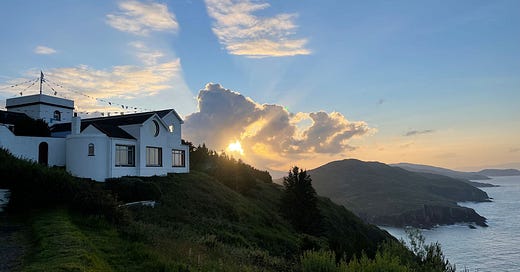Film review: Chasing The Light
West Cork has long drawn all sorts. Chasing the Light, now playing at the Triskel, tells the story of a retreat centre that opened its doors to the world, and the troubles that followed.
Maurice O’Brien’s latest documentary ‘Chasing The Light’, is a heartfelt and poignant exploration of one young and idealistic couple’s dream of building a place of refuge on the remote edge of a cliff in West Cork in the early 1970s.
While Dzogchen Beara, the Tibetan Buddhist Retreat Centre which Peter and Harriet Cornish established is still going strong today, as this meditative documentary reveals, it has had to weather more than its fair share of scandal and heartbreak along the way.
The Cornish’s journey from first arriving in rural Ireland, to growing their centre into a world-renowned spiritual home from home for thousands of people, is quite remarkable.
This is captured in O’ Brien’s film through some quaint old footage of the couple as they set about laying the bricks of the very first building, all the way up to some more recent shots of the construction of an extravagant new temple.
Interspersed throughout all of this is interview footage with the late Peter, who passed away in 2023. He comes across as a gentle soul still carrying the tremendous loss of his wife, who died of cancer at the age of 44.
Having suffered from failing eyesight for most of his life, Cornish’s piercing blue eyes and scraggly beard give him the sage-like appearance of someone who has spent a great deal of time reflecting on the immense joy and suffering of both his own and other people’s lives.
However, there is no sense of bluster from him and indeed his sharp wit and genuine compassion comes to the fore as he recounts the couple’s first two two decades in West Cork when they made significant progress in realising their vision for the centre.
In 1992 however, a year before Harriet passed away, the couple decided to gift the land and buildings to a charitable trust under the spiritual guidance of Sogyal Rinpoche author of the highly acclaimed ‘The Tibetan Book of Living and Dying’ and founder of Rigpa, an international network of Buddhist centres and groups.
It is Rinpoche then who comes to dominate the remainder of the documentary as his charisma and unorthodox methods of teaching are examined by people at the centre who encountered him on his annual visits to West Cork.
Rinpoche is shown in varying clips, giving interviews and delivering his teachings with an ever present smile on his face and he is spoken about with a mixture of coy reverence and admiration.
However, allegations of sexual misconduct and abuse against Rinpoche surfaced in 2017 through a letter signed by a number of his past pupils in France, Australia and the U.S.A. which rocked Dzogchen Beara and which Peter felt as a particular blow to his life’s work.
Following this, the contradiction between Rinpoche’s behaviour and his teachings come under much scrutiny, but shocking as these revelations might have been at the time, they were in fact nothing new.
Rinpoche was first accused of misconduct in the form of a $10 million dollar lawsuit in 1994. This unfortunately is entirely absent in the documentary and the question would have to be asked as to why it is portrayed in this way?
One interviewee mentions that he had heard rumors in the past but nothing was done about it and it is the usual tale then of someone with great power and influence, being surrounded by vulnerable people and abusing this position.
In one memorable scene where former President Mary McAleese visited the centre, she looks out at the ocean and makes a rather strange remark “how could anyone be afraid of eternity while looking at that?”
Seated behind her is the smiling Rinpoche, his halo still firmly in place, perhaps musing instead on the French poet Baudleaire’s question. What can an eternity of damnation matter to someone who has felt the infinity of delight?
Because, although Rinpoche was forced to step down from the organisation he led, he still maintained his conscience was clear until his death in 2019, which as this film shows, is clearly not the case for those he encountered.
O’Brien’s handling of this rich subject matter however, while thoughtful and well crafted, at times becomes a bit heavy handed. When Rinpoche is finally unmasked he is from then on shown as stern and bloated, deliberately leading the viewer in how to make up their mind.
But the biggest issue is that there are no outside voices present in the film to offer any strong counterpoint to the testimonies of those well acquainted with the centre.
It would’ve been interesting to hear what the people of Beara made of all this, even if just one or two locals who could’ve given an alternative perspective.
Nonetheless ‘Chasing the Light’ is an enjoyable film, which certainly throws up some fascinating questions, especially around teaching and devotion, but much like the shot of the peacock looking in the mirror at a temple, it is perhaps a little too focused on its own reflection.
‘Chasing The Light’ is showing nighty at 8pm at the Triskel Arts Centre on Tobin Street until Wednesday, January 15. For more info on tickets, please see here
From the archive:
To make tripe and drisheen great again, a Tipperary chef makes it Japanese
When I dropped by the small but industrious kitchen in Miyazaki on Evergreen Street one morning last week it was still a week out from the Cork on Fork food festival where chef Mike McGrath and his team at Miyazaki are going to attempt to make tripe and drisheen great again.





